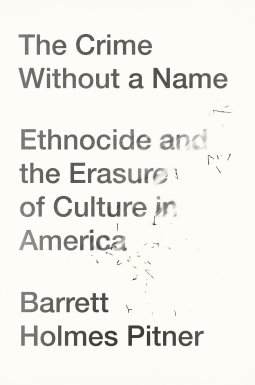
The Crime Without a Name
Ethnocide and the Erasure of Culture in America
by Barrett Holmes Pitner
This title was previously available on NetGalley and is now archived.
Buy on Amazon
Buy on BN.com
Buy on Bookshop.org
*This page contains affiliate links, so we may earn a small commission when you make a purchase through links on our site at no additional cost to you.
Send NetGalley books directly to your Kindle or Kindle app
1
To read on a Kindle or Kindle app, please add kindle@netgalley.com as an approved email address to receive files in your Amazon account. Click here for step-by-step instructions.
2
Also find your Kindle email address within your Amazon account, and enter it here.
Pub Date Oct 12 2021 | Archive Date Oct 12 2021
Catapult, Counterpoint Press, and Soft Skull Press | Counterpoint
Talking about this book? Use #TheCrimeWithoutaName #NetGalley. More hashtag tips!
Description
A personal and philosophical journey to find the language needed to describe, combat, and transcend racism, and to cultivate previously unimaginable solutions to society’s divisions and systemic inequalities.
In this incisive blend of personal narrative and philosophical inquiry, journalist and activist Barrett Holmes Pitner seeks a new way to talk about racism in America. Ethnocide, first coined in 1944 by Jewish exile Raphael Lemkin (who also coined the term genocide), describes the systemic erasure of a people’s ancestral culture. Dating back to the transatlantic slave trade and reaching new resonance in a post-Trump world, Black Americans have endured this atrocity for generations.
The Crime Without a Name guides readers through:
• The historical origins of ethnocide in the United States
• The author's personal, lived consequences of existing within this ongoing erasure
• Ways to combat and overcome America's ethnocidal foundation
• How new language can reshape our understanding of the past and expand the possibilities of the future
Just as the concept of genocide radically reshaped our perception of human rights in the twentieth century, reframing discussions about race and culture in terms of ethnocide can change the way we understand our diverse and rapidly evolving racial and political climate in a time of increased visibility around police brutality and systemic racism. The Crime Without a Name offers readers the historical origins of ethnocide in the United States, while examining the personal, lived consequences of existing within an ongoing erasure.
In this incisive blend of personal narrative and philosophical inquiry, journalist and activist Barrett Holmes Pitner seeks a new way to talk about racism in America. Ethnocide, first coined in 1944 by Jewish exile Raphael Lemkin (who also coined the term genocide), describes the systemic erasure of a people’s ancestral culture. Dating back to the transatlantic slave trade and reaching new resonance in a post-Trump world, Black Americans have endured this atrocity for generations.
The Crime Without a Name guides readers through:
• The historical origins of ethnocide in the United States
• The author's personal, lived consequences of existing within this ongoing erasure
• Ways to combat and overcome America's ethnocidal foundation
• How new language can reshape our understanding of the past and expand the possibilities of the future
Just as the concept of genocide radically reshaped our perception of human rights in the twentieth century, reframing discussions about race and culture in terms of ethnocide can change the way we understand our diverse and rapidly evolving racial and political climate in a time of increased visibility around police brutality and systemic racism. The Crime Without a Name offers readers the historical origins of ethnocide in the United States, while examining the personal, lived consequences of existing within an ongoing erasure.
Available Editions
| EDITION | Hardcover |
| ISBN | 9781640094840 |
| PRICE | $26.00 (USD) |
| PAGES | 336 |



